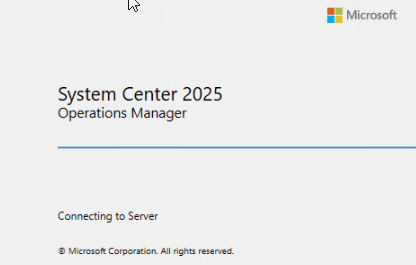Today Microsoft has released the newest version of SCOM 2025 with other products in the System Center Suite as well (VMM, DPM, SCSM, SCOM, and SCORCH).
We were fortunate enough to test this version a bit before it got released in preview versions and in the currently released version.
As Microsoft has released Azure Monitor SCOM Managed Instance almost a year ago, a lot of the effort is reserved for that product and SCOM on-premises is getting less in time reserved. Because of this we can say SCOM 2025 is more of an adoption of some security and version updates to SCOM 2022.
This makes it very similar to its predecessor in terms of support matrix both on operating systems and SQL requirements.

Changes and additions
Support for Windows Server 2025
Of course, this does not mean there is no change. With the release of Windows Server 2025, SCOM 2025 now supports Windows Server 2025 as all the products of System Center Suite 2025 do. This is for the OS it can run on, but also the agents it supports.
Support for OpenSSL 3.1 to 3.3
OpenSSL support for Red Hat Enterprise Linux Server 7 remains as 1.0.1e-fips but it extends to “1.0, 1.1 or 3.0 to 3.3” for following UNIX and Linux operating systems and packages
- SUSE Linux Enterprise Server 12
- Universal Linux (Debian package)
- Debian 9, 10, 11, and 12
- Ubuntu 16.04, 18.04, 20.04, 22.04 and 24.04
- Universal Linux (RPM package)
- Oracle Linux 7 and 8
- SLES 15
- openSUSE Leap 15t
- Rocky 8
- Alma 8
- Red Hat Enterprise Linux (RHEL) Server 8 and 9
Support for newest browsers of Chrome and Edge
Microsoft Edge version 121 and later with IE compatibility mode.
Google Chrome version 121 and later
Important Note: Service Provider Foundation (SPF) is discontinued from SCOM 2025, however SPF 2022 will continue to work with SCOM 2025 components
SCOM 2025 Support Matrix
As we have said above now SCOM 2025 supports Windows Server 2025 for all of its roles like Agent, Gateway, Web Console, Console, Reporting Server, and Management Server.
Unlike its predecessors, SCOM 2025 supports two previous versions of Windows Server operating system which is Windows Server 2019 for all its roles which also becomes the minimum OS officially supported for them as well.
As of SCOM 2025 we now see that support for Windows Server 2012, Windows Server 2012 R2 and Windows Server 2016 is dropped for Windows Agent. This only means the agent does not install on older operating systems, but older version agents will still be able to connect to a SCOM 2025 Management Group.
On the agent side Windows 11 is also added to the support matrix.
SQL Requirements
SQL requirements for SCOM 2025 are pretty much the same as SCOM 2022 which are
- SQL Server 2022 with a minimum Cumulative Update 11 (CU11) or later
- SQL Server 2019 with a minimum Cumulative Update 8 (CU8) or later update
- SQL Server 2017 with the latest available update
Upgrade to SCOM 2025
Although SCOM 2025 support matrix is wider than expected it is only directly upgradeable from SCOM 2022. This is the same for any previous version of SCOM. An in-place upgrade is meant to support only 1 version up.
If your environment is healthy and available for an in-place upgrade to SCOM 2022, we can advise to do a second upgrade right after upgrading to SCOM 2022 which has almost the same requirements. The advantage of such a move will be that any upgrade planned on any role or SQL will be supported and you would be resetting the support lifecycle. However, the migration or upgrade paths are dependent on more considerations, different for each of you. We will be happy to help advise you for the best applicable path for your organization.
You can also expect a few webinars on this topic in the coming months, with the first being at Silect MP University on 26 November 2024.
Documentation
Meanwhile the new set of documentation has been released for several System Center 2025 products already.
For SCOM 2025, you can find the documentation here:
https://learn.microsoft.com/en-us/system-center/scom/welcome?view=sc-om-2025
Learn more!
If you want to learn more about SCOM 2025, we invite you to also follow our trainings and webinars and we can also always be contacted to discover what it could mean for you and what the best approach would be going forward in your monitoring and observability journey.
As an important sidenote here, we are currently developing a SCOM Migration and Upgrade workshop day where we have more time to explore some options and explain how you can execute on those to get to a newer, more supported, or fresher SCOM environment. We expect to start presenting this training in January 2025.
Enjoy!
